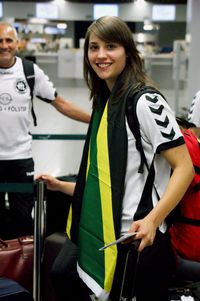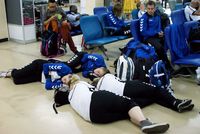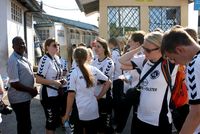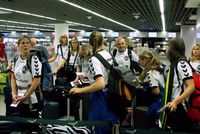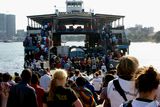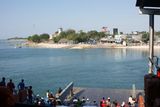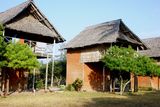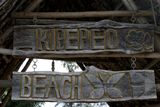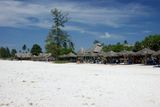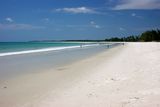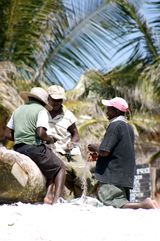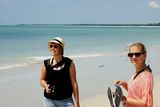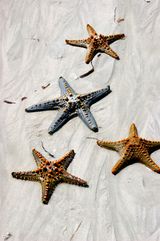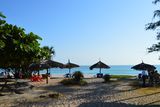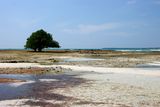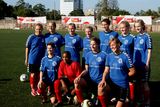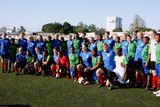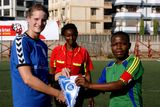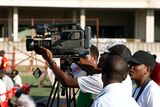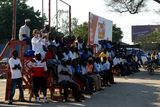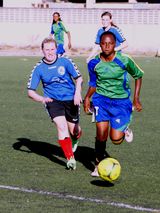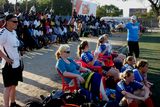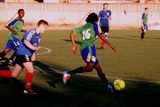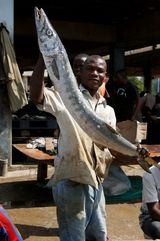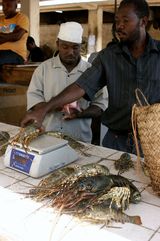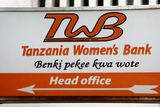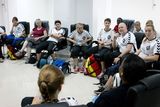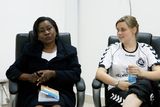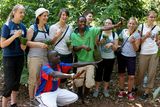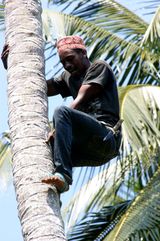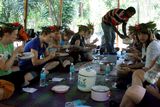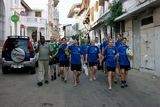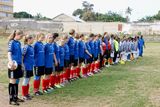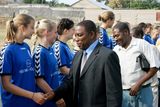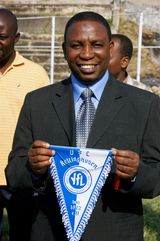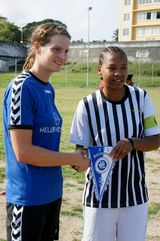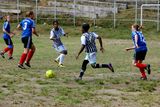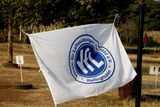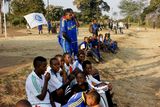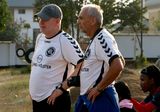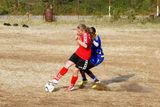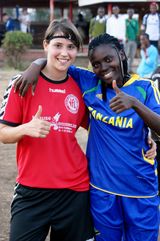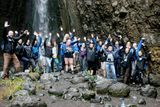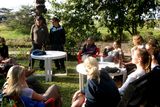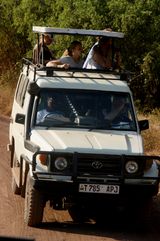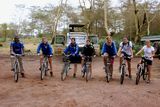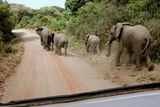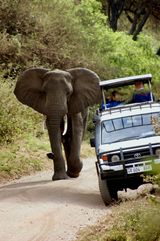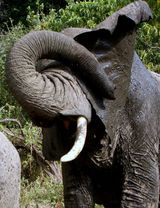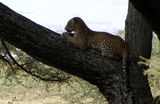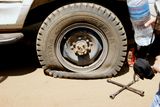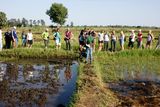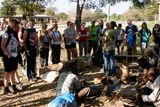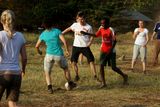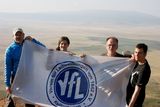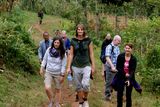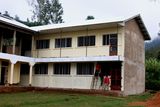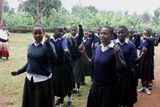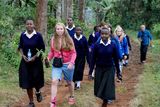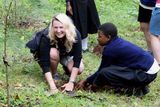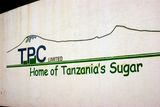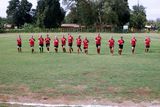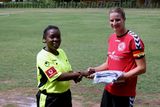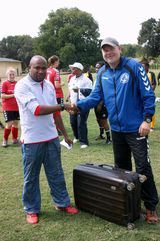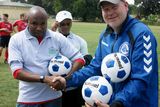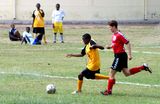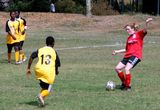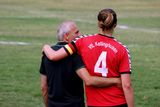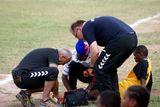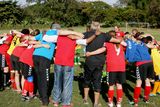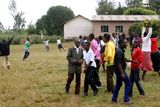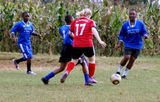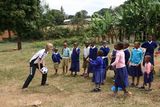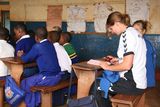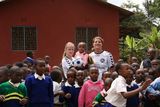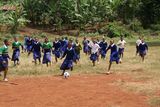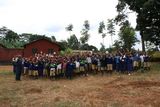Soccer, binoculars, fair trade: A journey to Tanzania
by Marcus Wack (August 2013)
This has never been done before: A complete women’s soccer team travelled to Tanzania and played against local women’s teams. This way, they committed to strengthening women in the Tanzanian society. The route led the footballers of VfL Kellinghusen through the city Darussalam, to the island of spices Sansibar, to Arusha, to different national parks as the Ngorongoro crater and to the Kilimanjaro. The focus was set to the building of a Secondary School that the association RAFIKI e.V. has built with Tanzanian partners and that is being supported by the population of Kellinghusen. The footballers were received by the German embassy as well as the first women’s bank of the continent.
The project was financed by, inter alia, Bingo-Lotto, the Christian development service and the state of Schleswig-Holstein. Apart from that, the companies Autohaus Hellwig+Fölster GmbH, the BiBeKu GmbH as well as Hummel Sport & Leisure GmbH supported the team. Additionally the team financed a big part of the journey themselves by organizing many events during the past year. Oliver Zantow and Marcus Wack of the association RAFIKI e.V. took organisation of the trip as they had already lead many groups of schools or universities through the country before. The studied tourist guide and partner of RAFIKI e.V. Gilbert Towo took the Tanzanian part of organisation.
Arrival: Wrist – Daressalam
The train station of Wrist was the starting point of the travel through Hamburg, Frankfurt, Addis Abeba to Daressalam that took twenty hours. Many parents and friends, but also the newspaper Norddeutsche Rundschau came together at the station to say goodbye to the 23-member travel group of the VfL Kellinghusen to Eastern Africa. Apart from that the radio stations NDR and RSH had reported about our trip. Every footballer had a second suitcase apart from their own one. In this additional baggage, that were 25 kg each, many relief supplies for schools, preschools, vocational centres, social establishments and sports clubs were packed.
Part 1: Daressalam
The first station of our journey was Daressalam, the former capital city and still the biggest city of Tanzania.
We were accommodated in a beautifully situated hotel in the district of Kiganboni close to the beach. We could perceive our different sports events and encounter visits from there.
In the context of sports a very interesting match against the team Sayari Queens F.C. from Darussalam lied ahead. This strongest and most successful women’s team of the country presents itself full of national players that were partly already in Europe or active in the Turkish or Swedish league. Under the unusual climatic conditions and after an exhausting arrival the VfL girls couldn’t do much against the strong African team. Jule Mohr could reduce the gap from the perspective of Vfl in the 56th minute to 1:3, before the hosts turned the score into 9:1 (3:0). The frame and organisation of the match were impressive. The match took place at artificial turf at the area of the Tanzanian Football Association (TFF). Four referees were responsible for leading the game and numerous magazines as well as the East-African-TV reported. The match was worth a ten minute TV report during the 7 o’clock news. Outstanding footballers were during this afternoon without doubt Sophia Mwasikili, the team captain of the Tanzanian national team, the so called “Twiga Star”.
Beyond soccer very interesting visits and discussions in the German empbassy, the Tanzanian Women Bank (TWB), the fish market of the metropolis and a fast-breaking were part of the program. Thereby the fishers and fishmongers guided us through the fish market of Daressalam and explained their different activities. Very exciting and a celebration for all senses! The headmistress of the TWB has presented the ideas and the effect of her almost unprecedented project with her assistant. Apart from that we were received in the German embassy and one of the employees explained to us the tasks in a very clear and detailed way. We could witness the life in the metropolis very closely because we walked. As it was the middle of Ramadan it was hard to get something to eat for lunch for our team, even here in Dar.
Part 2: Zanzibar
The spice island of Zanzibar was our second destination. At this very Muslim-dominated island the second match of the journey. It was almost sensational that one of the five teams played in the middle of the Ramadan could and wanted to play against us. Our visit had such a big impact on the small, semi-autonomous island that even the minister for sports ran aground before the whistle and he the German and Zanzibarian teams welcomed individually with a handshake.
In the team of the New Generation Zanzibar Queens eight Zanzibarian and two Tanzanian national players were playing. At a difficult track a balanced game developed that ended according to performance 1:1 (1:1). The goal for the VfL was shot by Tine Peters. After the match we handed over a suitcase with training material as jerseys, shoes, balls etc. Especially in this situation we realized that we were in one of the poorest areas of the world.
We were very impressed by the visit of a spicy farm, conversations with the farmers, a trip to prison island, the visit of an old sultan palace and coming to know with old Arabic stone town with a cathedral, slave market and museum as well. This gave us a wonderful insight into the changeful history of the island.
Part 3: Arusha
We flew from Zanzibar past the Kilimanjaro back to the mainland to Arusha. The stay was short and we prepared the big safari to the national park.
The obligatory soccer match took place approximately 48 hours after the match in Zanzibar, outside of the city Arusha against the Testemony Sports Academy. Om a very African, sandy and dusty ground the hosts won with 2:0 (1:0). The public interest including the local media was big once again and after the match both teams met and we ate together and celebrated an atmospheric party with many interesting personal contacts.
To prepare the trip through the big national park the VfL group made a walking tour as well as a small safari in the Arusha national park. We made first contacts with the significantly colder climate in the higher areas and we came to know the first wild animals as buffaloes, giraffes or zebras.
Part 4: Mto wa Mbu and Ngorongoro
The journey continued to Mto wa Mbu and the the lake Manyara national park by cross county vehicle. The VfL girls saw elephants, water buffaloes, hippos, zebras as well as leopards in the next days on different trips by cross country vehicles or bike, sometimes at close range.
There were no matches planned in this area. Nevertheless there was a surprising match in the middle of the town Mto wa Mbu on a wasteland area. During an adventurous walk through the town we met a group of football playing boys and we didn’t want to miss the chance to get involved. A lively, very African kick developed out of this, much to the delight of numerous villagers. For all parties this match was an impressive experience.
The visits at the carving men of the folk of Makonde, the Massai who live in a very traditional way and dinner at a Tanzanian extended family gave impressions to the life of the people in that part of Tanzania.
One of the highlights of the journey for all of us was the Safari to the Ngorongoro-crater. After seeing off from out bushcamp near Mto wa Mbu we visited the Ngorongoro national park for two days. First we spent a night in a camp at a height of 2300 meters at the edge of the crater. Visits of elephants and buffaloes between the tents in the evening, constant protection by armed Massai, great regional food, temperatures around 0°C at night and very short nights were very unfamiliar to us and caused some borderline experiences. But we were rewarded by a very impressive safari through the crater with its zillion wild animals. Many of us saw rhinos and lions for the first time in wildlife.
Part 5: Kilimanjaro
The last part of our journey meant for some participants: “We’re going home!” A daytrip by car should bring us to Mrimbo beneath the Kilimanjaro. At this place Oliver and Marcus as well as our Tanzanian guide Gilbert Towo support the building of the KIUMAKO Secondary School and the work in several social projects of the region for many years via the association RAFIKI e.V.. Gilbert was born here, he grew up in this region and is nowadays part of many local social projects. After numerous stays and the building of the school Oliver and Marcus feel almost home here as well.
Tours through the surrounding villages, visiting farms and the primary as well as the Secondary School and the kindergarten and joint planting of trees with students gave us another look into the Tanzanian daily life.
We played soccer two times. In Moshi we won against a selection team 5:0 and we played against the female students of the Kiumako Secondary school under large attendance of the local population – a friendly match without evaluation. After the match in Moshi we visited a big sugar factory with our opponents.
We took one whole day to distribute aid supplies in schools, hospitals, kindergartens etc. In small groups of maximum three players we went to different institutions and projects with our Tanzanian partners.
At the end of this unique adventure a big celebration was arranged by our Tanzanian hosts in Mrimbo. Many of our Tanzanian friends and partners participated and traditional rituals such as the frying of a goat were part of the celebration as well as awesome DJs with Tanzanian pop music. We celebrated and danced until early morning.
Subsided by:






